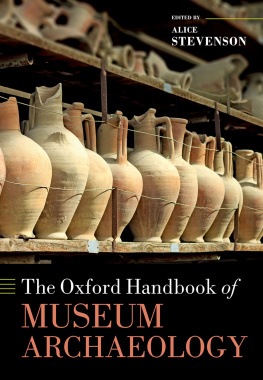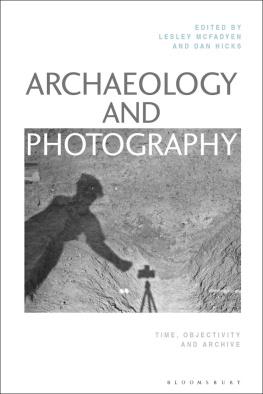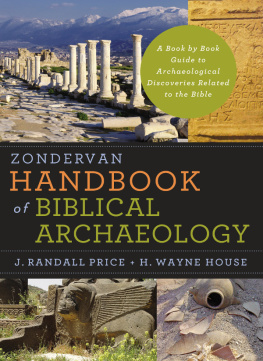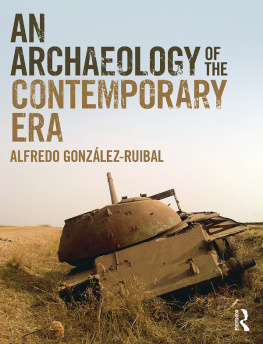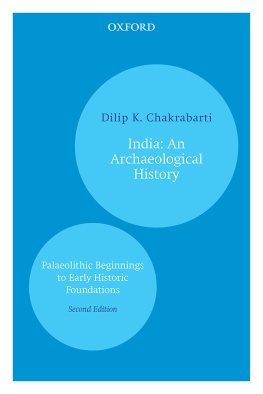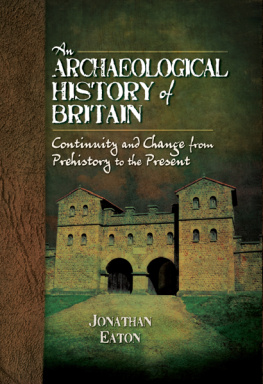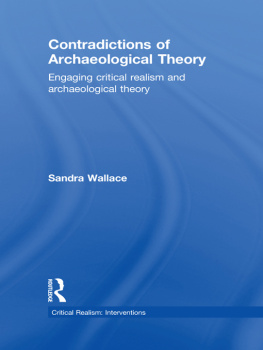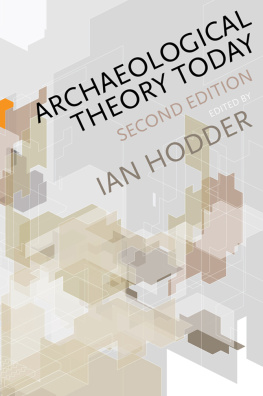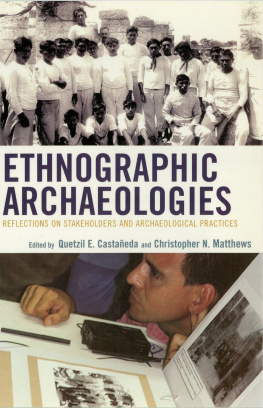THE OXFORD HANDBOOK OF
Museum Archaeology

Great Clarendon Street, Oxford, OX2 6DP,
United Kingdom
Oxford University Press is a department of the University of Oxford.
It furthers the Universitys objective of excellence in research, scholarship, and education by publishing worldwide. Oxford is a registered trade mark of Oxford University Press in the UK and in certain other countries
Oxford University Press 2022
The moral rights of the author have been asserted
First Edition published in 2022
Impression: 1
All rights reserved. No part of this publication may be reproduced, stored in a retrieval system, or transmitted, in any form or by any means, without the prior permission in writing of Oxford University Press, or as expressly permitted by law, by licence or under terms agreed with the appropriate reprographics rights organization. Enquiries concerning reproduction outside the scope of the above should be sent to the Rights Department, Oxford University Press, at the address above
You must not circulate this work in any other form and you must impose this same condition on any acquirer
Published in the United States of America by Oxford University Press
198 Madison Avenue, New York, NY 10016, United States of America
British Library Cataloguing in Publication Data
Data available
Library of Congress Control Number: 2022905074
ISBN 9780198847526
eISBN 9780192586759
DOI: 10.1093/oxfordhb/9780198847526.001.0001
Links to third party websites are provided by Oxford in good faith and for information only. Oxford disclaims any responsibility for the materials contained in any third party website referenced in this work.
Acknowledgements
the production of this volume coincided with the pandemic of the early 2020s. For many contributors, access to libraries, time to develop thinking, and positive space to complete writing was severely diminished. Caring responsibilities, personal losses, and the anxiety of uncertain situations all took their toll. For all of these reasons I would like to extend my appreciation for everyones efforts that have been involved at any stage in this volume, whether published here or not.
The chapter on dis/Ability and archaeology was originally to be authored by Theresa OMahony, founder of Enabled Archaeology, but she sadly passed away before she was able to develop her chapter. Nevertheless, the legacy of her activism and scholarship are fully evident in , and I am grateful to Abigail Hunt and Thomas Kitchen for taking her work forward, and to Erik DeScathebury and Sarah OMahony for their support.
In the development of the book I am grateful to several colleagues for their advice, including Manuel Arroyo-Kalin, John Baines, Megan Gooch, Sudeshna Guha, Koji Mizoguchi, Christina Riggs, Suzie Thomas, and Kevin Macdonald. In helping with some of the more complex referencing in the volume I would like to thank Paige Brevick and Yijie Zhuang. Finally, I would like to thank OUPs Charlotte Loveridge, Jenny King, and Karen Raith for their assistance throughout production.
Contents
Alice Stevenson
Graldine Delley and Nathan Schlanger
Cressida Fforde, Jilda Andrews, Edward Halealoha Ayau, Madalyn Grant, Laurajane Smith, and Paul Turnbull
Cressida Fforde, Jilda Andrews, Edward Halealoha Ayau, Laurajane Smith, and Paul Turnbull
Donna Yates and Emiline Smith
Marcia Bezerra and Luzia Gomes Ferreira
Laura Osorio Sunnucks
Abigail Hunt and Thomas Kitchen
Jessica S. Johnson and Brian Michael Lione
Georgios Papaioannou
Rachel Ama Asaa Engmann
S. Terry Childs
George Okello Abungu
Gail Boyle
Jennifer Reynolds-Kaye
Stefanie Klamm
John Kannenberg
Simon J. Holdaway, Joshua Emmitt, and Rebecca Phillipps
James L. Flexner
Patrick Sean Quinn
Barbara Wills
Siyu Wang and Kan Hang
Paul Collins
Karen Exell
Duygu Tarkan and eyda etin
Gertrude A.M. Eyifa-Dzidzienyo
Paolo Del Vesco
Daniel Pett
Ville Rohiola and Jutta Kuitunen
George Okello Abungu is a Cambridge-trained archaeologist and Emeritus Director-General of the National Museums of Kenya. He has been a guest scholar at the Getty Conservation Institute and Getty Research Institute and visiting professor in numerous universities worldwide. He is a recipient of the Ife Prize in Museology 2007; Distinction of Passeur du Patrimone 2009; Lifetime Achievement in Defense of Art 2012, ARCA; Chevalier de lOrder de Arts et des Lettres 2012, France; AWHF Award 2016; and Ordre National Du Lion Chevalier 2018, Senegal. He has published in archaeology, heritage management, illicit trafficking in heritage, restitution, museology, and heritage and sustainable development. He is a Fellow of the Stellenbosch Institute for Advanced Studies, University of Stellenbosch, was Elizabeth Eddy Professor of Applied Anthropology, University of Florida, and founding Professor of Heritage Studies, University of Mauritius. He serves as Special Advisor to the Director General of ICCROM, Rome.
Jilda Andrews is an Indigenous cultural practitioner and museum anthropologist based in Canberra, Australia. Currently a Research Fellow with the Australian National University and the National Museum of Australia, Jilda draws from her Yuwaalaraay heritage to investigate networks of relationships in museum collections. Her approach pushes the definition of custodianship in museums, from one which is focused on maintaining collections, to one which strives to recognize connections between objects and the systems which produce them. Recent publications include String ecologies: Indigenous country and pastoral empires in Ancestors, Artefacts, Empire: Indigenous Australia in British and Irish museums (British Museum Press, 2021).
Marcia Bezerra is a professor at the Universidade Federal do Par, in the Amazon, where she teaches archaeology to the Undergraduate Program in Museology/FAV/ICA and the MA/DSc Program in Anthropology/PPGA. She holds a BA in Archaeology (FINES/RJ), MA in Ancient and Medieval History (UFRJ), and DSc in Archaeology (USP). She is the former president (20132016) of the Society of Brazilian Archaeology (SAB) and Southern America Representative of the World Archaeological Congress/WAC (20082016). She has conducted research in the Brazilian Amazon since 2008. Her interests include material culture studies, collecting practices, ethnography of heritage, Amazonian archaeology, archaeological representations, museum archaeology, heritage education, and the teaching of archaeology.
Gail Boyle has been a successful museum archaeologist for more than 30 years. As Chair of the Society for Museum Archaeology (20122018) she developed and directed its strategic role at a national level as well as co-authoring guidance on best practice. She is a Fellow of the Museums Association and a Treasure Valuation Committee member: she sits on several national advisory boards, including the Portable Antiquities Advisory Group and Historic Englands Archaeological Archives Advisory Panel, and is also Vice-Chair of Bristol and Gloucestershire Archaeological Society Council and Fellow of the Society of Antiquaries of London. She has long-standing collaborative and teaching relationships with both the University of Bristol and the University of the West of England.
eyda etin

